Crime and punishment in the wildlife trade - WWF UK
Crime and punishment in the wildlife trade - WWF UK
Crime and punishment in the wildlife trade - WWF UK
You also want an ePaper? Increase the reach of your titles
YUMPU automatically turns print PDFs into web optimized ePapers that Google loves.
to certa<strong>in</strong> conditions, it allows for <strong>the</strong> arrest of a suspected offender, without warrant, where <strong>the</strong><br />
arrest<strong>in</strong>g officer reasonably believes that <strong>the</strong> suspect is committ<strong>in</strong>g, has committed or is about to<br />
commit an offence. The relevant section of <strong>the</strong> Police <strong>and</strong> Crim<strong>in</strong>al Evidence Act 1984<br />
(PACE) 29 means that <strong>the</strong> power of arrest without warrant is triggered by <strong>the</strong> present, past or<br />
future commission of a number of specified offences. The power br<strong>in</strong>gs with it additional<br />
powers of detention, search <strong>and</strong> seizure that would o<strong>the</strong>rwise require a warrant.<br />
The rationale beh<strong>in</strong>d <strong>the</strong> development <strong>and</strong> def<strong>in</strong>ition of arrestable offences was simplification –<br />
so that <strong>the</strong> many statutory powers of arrest that existed prior to PACE could be rationalised <strong>and</strong><br />
be made simpler to process. The list of arrestable offences is given <strong>in</strong> <strong>the</strong> Act <strong>and</strong> additionally<br />
<strong>in</strong>cludes those for which a custodial sentence of five years could be imposed – which<br />
demonstrates a will<strong>in</strong>gness on <strong>the</strong> part of legislators <strong>and</strong> policy-makers to deal with perceived<br />
crim<strong>in</strong>al threats <strong>and</strong> <strong>the</strong> problems <strong>the</strong>y pose as <strong>the</strong>y arise. One recent example is <strong>the</strong> extension<br />
of <strong>the</strong> arrestable offence powers to certa<strong>in</strong> offences committed under <strong>the</strong> Wildlife <strong>and</strong><br />
Countryside Act 1981 (WCA), brought about by <strong>the</strong> new Countryside <strong>and</strong> Rights of Way Act<br />
2000 (CRoW).<br />
It would be sensible <strong>and</strong> desirable if <strong>the</strong>se positive steps were emulated <strong>in</strong> relation to offences<br />
under COTES, <strong>in</strong> order to achieve greater consistency <strong>and</strong> certa<strong>in</strong>ty with<strong>in</strong> <strong>the</strong> matrix of<br />
offences committed aga<strong>in</strong>st <strong>wildlife</strong>. CRoW guidel<strong>in</strong>es make <strong>the</strong> po<strong>in</strong>t that <strong>the</strong> majority of<br />
offences covered by <strong>the</strong> Act <strong>in</strong>volve species of conservation concern. Logically, this should also<br />
apply to species on <strong>the</strong> CITES appendices <strong>and</strong> <strong>the</strong> EC Regulation Annexes, so that <strong>the</strong>y, too,<br />
can become arrestable. But a change to PACE to <strong>in</strong>corporate such arrestable offences can only<br />
be accomplished by Act of Parliament. 30 However, rais<strong>in</strong>g <strong>the</strong> maximum penalty under COTES<br />
to five years imprisonment would achieve <strong>the</strong> same result. Any amendments could form part of<br />
a general crim<strong>in</strong>al law amendment or consolidation bill.<br />
In <strong>the</strong> meantime <strong>the</strong> paradox is that, <strong>in</strong> <strong>the</strong>ory, a person could be arrested without warrant for<br />
attempt<strong>in</strong>g to sell, or <strong>in</strong> any o<strong>the</strong>r way <strong>trade</strong> <strong>in</strong>, a native species, but <strong>the</strong>y would not be liable to<br />
immediate arrest if <strong>the</strong> offence were under COTES. It is <strong>in</strong>terest<strong>in</strong>g to note that research<br />
commissioned by DEFRA 31 among <strong>the</strong> police, customs, o<strong>the</strong>r enforcement agencies <strong>and</strong> NGOs<br />
found that <strong>wildlife</strong> <strong>trade</strong> offences were regarded by <strong>the</strong> majority of respondents as <strong>the</strong> most<br />
serious <strong>wildlife</strong> crimes. Clearly, <strong>the</strong>refore, <strong>the</strong> current unequal situation between COTES <strong>and</strong><br />
CEMA offences is nei<strong>the</strong>r logical nor tenable.<br />
It should also be noted that COTES offences, although not arrestable, possess many of <strong>the</strong><br />
characteristics associated with <strong>the</strong> most serious arrestable offences 32 . These <strong>in</strong>clude <strong>in</strong>terference<br />
with <strong>the</strong> adm<strong>in</strong>istration of justice, <strong>and</strong> substantial f<strong>in</strong>ancial ga<strong>in</strong>. Given <strong>the</strong> extremely high value<br />
of some <strong>wildlife</strong> specimens or <strong>the</strong>ir derivatives, <strong>and</strong> <strong>the</strong>refore <strong>the</strong> potential for huge profit for<br />
those <strong>in</strong>volved <strong>in</strong> <strong>the</strong> illegal <strong>trade</strong>, <strong>the</strong>se <strong>in</strong>creased powers may be appropriate.<br />
29<br />
S.24 PACE 1984<br />
30<br />
Personal communication, Home Office, March 2002.<br />
31<br />
Roberts M, Cook D, Jones P <strong>and</strong> Low<strong>the</strong>r J (2001): Wildlife <strong>Crime</strong> <strong>in</strong> <strong>the</strong> <strong>UK</strong>: towards a National Wildlife <strong>Crime</strong> Unit.<br />
Report for <strong>the</strong> Department for Environment, Food <strong>and</strong> Rural Affairs.<br />
32<br />
See for example s.116 PACE, serious arrestable offences. This is <strong>in</strong> effect a compound<strong>in</strong>g factor, triggered by <strong>the</strong><br />
factors referred to above, that <strong>in</strong>creases police powers to deta<strong>in</strong> <strong>and</strong> deny immediate access to a solicitor or o<strong>the</strong>r<br />
person.<br />
17


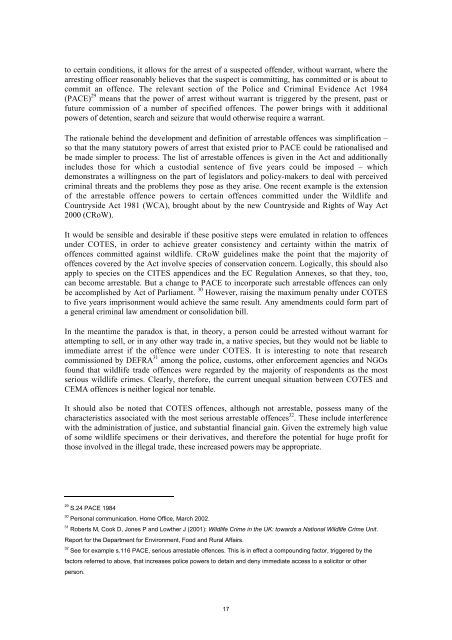
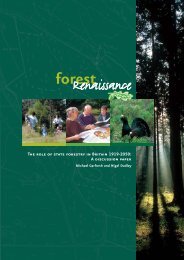
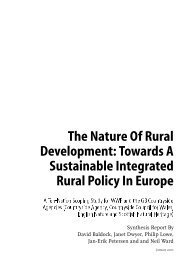
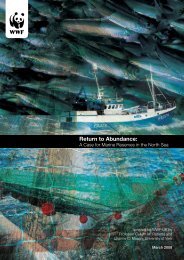

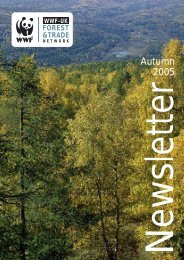
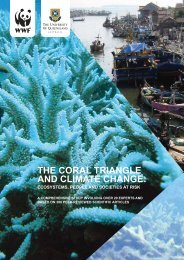
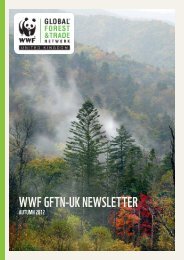
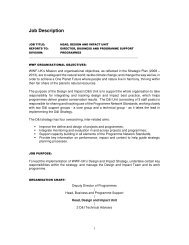
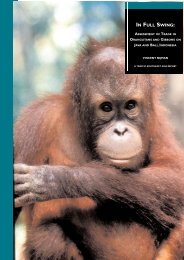
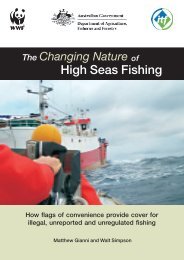
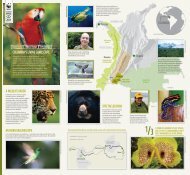
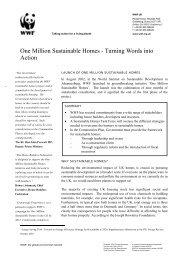
![[PDF] Causes for concern: chemicals and wildlife - WWF UK](https://img.yumpu.com/31929970/1/184x260/pdf-causes-for-concern-chemicals-and-wildlife-wwf-uk.jpg?quality=85)
